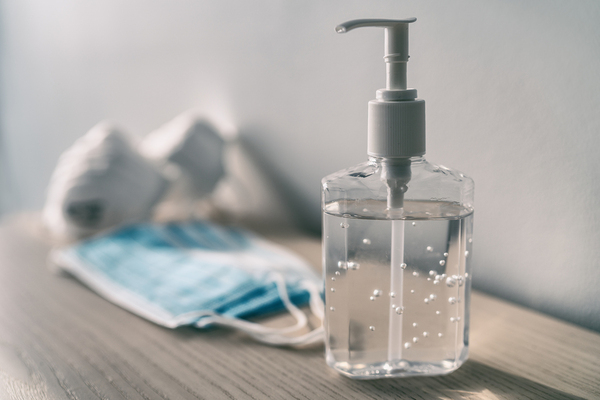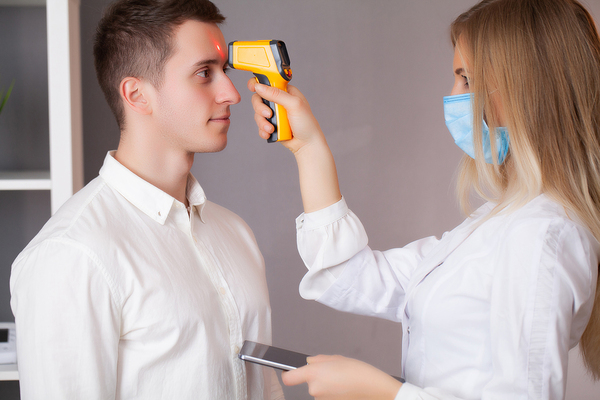View Sale Announcement Detail


Archived news
EXCERPT: As people start heading back to work after lockdowns to curb the coronavirus, safety measures are being adopted by employers. The question is, how much will such measures affect the "new" working environment?
 Hand sanitizing stations may be a more frequent staple as people go back to work to control the spread of COVID-19, but how much further are businesses going to go to ensure a safe work environment?
Hand sanitizing stations may be a more frequent staple as people go back to work to control the spread of COVID-19, but how much further are businesses going to go to ensure a safe work environment?
Life after the coronavirus will likely be much different compared to before the pandemic struck. As the economy slowly reopens and people get back to work, the professional landscape will take on a different look in an effort to avoid a second wave, or at least minimize it.
As people start heading back to work, they will likely be asked to approach their daily duties by keeping safety top of mind. And to ensure that workers are following these "rules," they may be watched a lot more closely than they may have been before the health crisis.
Employees to be More Closely Monitored to Control COVID-19 Spread
There is talk of businesses conducting temperature checks, requiring face masks to be worn, and frequent hand sanitization to maintain a coronavirus-free zone. Medical and other personal information may also be required to be disclosed.
At the most basic level, companies are adding precautions that involve extra cleaning and sanitizing, installing hand sanitizer stations at various checkpoints, placing markers on the floor to help people maintain a certain distance between each other, and spacing out desks. Some businesses may also cut down on the overall numbers of employees working at the same time by staggering shifts and allowing people to work remotely.
But monitoring for the virus might be taken to an even more innovative level.
Thermal cameras may be installed to detect body temperature, and mobile apps are being developed to help monitor how well staff is adhering to physical distancing measures. Some of the nation's largest companies and financial institutions may be on board with utilizing a mobile app that will track interactions among employees.
Some companies are even considering classifying employees in levels of risk to help determine who can return to work soonest. Risk levels range from those who have the antibodies against it after testing positive in the past (considered lowest risk) to those who have a chronic illness, are over the age of 65, or who smoke (considered highest risk).
 Temperature checks, among other safety measures, may become the norm as people start heading back to work.
Temperature checks, among other safety measures, may become the norm as people start heading back to work.
Heightened Monitoring May Impede Medical Privacy
There are certainly privacy and regulatory issues that will have to be sorted. Until a medicine or vaccine is developed to combat and even prevent COVID-19, many companies may feel that taking such drastic measures is the only way to conduct business to keep everyone safe.
To some degree, people are used to a heightened level of monitoring and security, particularly after the September 11 terrorist attacks. Immediately following those incidents, much more stringent security in the form of cameras and security checks was implemented in workplaces, airports, and even amusement parks, to name a few.
But the surveillance of workers is on an entirely different level thanks to the COVID-19 pandemic. While security may be a necessity to protect the greater good, some measures that are being adopted by employers may be considered by some to be crossing the line in terms of privacy. It's certainly an interesting dynamic for Western democracy.
The question is, how much are people willing to trade in the name of safety?
Banks and Lenders Need to Protect Themselves From Both the Virus and Economic Risk
The working environment for financial institutions is not immune to issues related to ensuring a safe working environment. But while banks and lenders sort these issues out, they should not forget to ensure that their loan portfolios are resilient in the midst of economic turmoil.
This is perhaps the perfect time to revisit your loan portfolio and make any necessary changes that will keep it safe in the face of a health crisis like COVID-19. Garnet Capital can help facilitate the sale and acquisition of loan assets to create a loan portfolio that can withstand the trials of national and global distress.
Sign up for our newsletter today.

